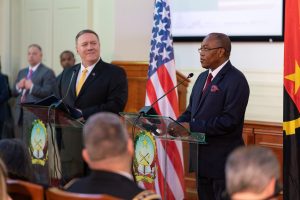U.S. Secretary of State Mike Pompeo delivered a speech in Addis Ababa, Ethiopia last week at the United Nations Economic Commission for Africa on promoting a model of American partnership to “liberate Africa’s entrepreneurs.” Without explicitly naming China, Pompeo issued a warning to African states to be wary of Beijing’s investments as it expands economic exchange, including via the Belt and Road Initiative (BRI).
“Not every nation doing business in Africa from outside the continent adopts the American model of partnership. Countries should be wary of authoritarian regimes with empty promises,” Pompeo said. “They breed corruption, dependency, they don’t hire the local people, they don’t train, they don’t lead them. They run the risk that the prosperity and sovereignty and progress that Africa so needs and desperately wants won’t happen,” he added.
Pompeo’s three-country African tour included stops in Senegal, Angola, and Ethiopia. Each of these countries has extensive links to China and its economy. For example, Senegal was the first West African country to join China’s BRI and it is the current co-chair of the Forum on China-Africa Cooperation (FOCAC). China is also a top import origin for Senegal. Angola is a major provider of oil for China and has received significant infrastructure loans. For Ethiopia, China is also a top export destination and source of imports. Separately Ethiopia is also a leading destination for Chinese investment and infrastructure projects.
Elsewhere on the continent, Kenya’s largest telecoms operator has announced it will consider using Huawei to develop its 5G network. The news comes as Washington has sought to convince partners around the world to refrain from signing 5G contracts with the Chinese technology firm, citing security concerns. China has been helping some African countries develop certain technologies, including artificial intelligence and facial recognition software, which many have come to associate with Beijing’s high-level surveillance apparatus.
While the Chinese media response to Pompeo’s Africa tour remained quiet, Lin Songtian, China’s ambassador to South Africa, described Pompeo as a latecomer to Africa, as it took nearly two years for him to finally visit the continent. Lin said that Washington pays insufficient attention to the continent, in contrast to the Chinese approach. Moreover, Lin criticized Pompeo for pushing a zero-sum, Cold War mentality “defined by hatred, hostility and ideological prejudice.”
Pompeo has delivered similar messages about China’s international activities many times, in many places. Earlier this month, addressing the National Governors Association, Pompeo stated “the China competition is happening. It’s happening in your states, and it’s a competition that goes to the very basic freedoms that every one of us values.” In January, speaking in Kingston, Jamaica, the U.S. secretary said, “It’s tempting to accept easy money from places like China. But what good is it if it feeds corruption and undermines your rule of law? What good are those investments if in fact they ruin your environment and don’t create jobs for your people?” He has also criticized the extensive use of Chinese loans, cautioning that Beijing’s “debt diplomacy” is an instrument of statecraft.
When it comes to Africa, Pompeo presented ties with the United States as a model for “true partnership” rooted in the pursuit of economic liberation in contrast with an unnamed authoritarian alternative. This very framing suggests that Washington may approach its broad vision for U.S. diplomacy in Africa as a contest for influence. “U.S. interests on the continent remain shaped, to its own detriment, by a perceived competition with China,” writes independent analyst Cornelia Tremann. Increasingly, this notion may not be solely confined to a particular region or foreign policy issue; U.S. policy around the world is colored by the idea of a competition with China.
Taken together, Pompeo’s remarks frame the U.S. view of China’s foreign policy and economic engagement squarely in a competitive lens, one that echoes an adversarial tone that is reminiscent of the Cold War era. This narrative has not gone unnoticed. For example, The Atlantic’s Uri Friedman recently penned “America Is Alone in Its Cold War With China” in which he analyzes Washington’s unsuccessful efforts to convince allies and partners to adopt “great power competition” and turn away from China. Competitive forces may be unavoidable in their entirety, yet promotion of a worldview wholly colored by opposition to China runs the risk of fanning the flames of hostility and escalation without the possibility of an off-ramp.

































